A property flier recently dropped into Bellevue’s postbox. It’s hardly newsworthy that some real estate agent was talking property on the Cap d’Antibes – but then this was hardly your run-of-the-mill pamphlet.
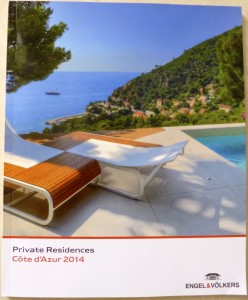
First off, it was a proper magazine with a spine. It had nearly 100 full-colour, glossy pages inside.
Second, I actually wanted to look at the magazine. Real estate fliers drop with a regular cadence into our postbox, some even with handwritten notes in French or English or Russian from hopeful agents saying they’d be more than thrilled to help us sell our property or buy a new one. These fliers promptly see the inside of a trash bin, but for some reason – call it socially acceptable snooping – I can’t help flipping through this new bit of publicity.
An opening note greets readers in the mandatory three languages. A second home, the agency’s directors say, should inspire its residents. It should encourage their creativity. Soon, very soon, I’ll discover a surprising absurdity in these pages – but for now I don’t. I’m led along the merry path. Does a panoramic sea view and clear blue sky nurture my soul? Or is it ancient country charm?
Perhaps I need a penthouse overlooking Cannes’ famous Croisette shopping district. Here’s a spot with three bedrooms – 900 square feet costing a cool $5 million.
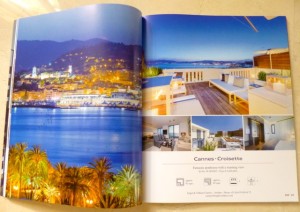
Prefer to spread out more? Why not visit the Cap d’Antibes and check out this “charming” three-bedded seaside villa? It’s four-times bigger than the Croisette penthouse with a quarter-acre of land to boot. (For $17.5 million, I’m hoping “charming” has a more positive spin than it usually does – that the word isn’t barely cloaked code for a place where the poor buyer will be stamping his own style on every floor tile upward.)
Or why not purchase on Cap Ferrat, the prestigious locale where French Lessons enjoyed its rather un-American Fourth of July? Here, in fact, is a villa offering direct sea access (in a fashion that obliterates the need for any Stairmaster) for – gosh, how does one set a price on the priceless? Let’s call it even at $38 million.
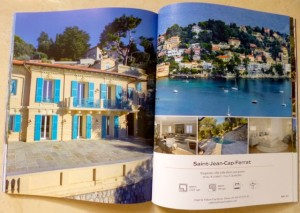
As the magazine’s pages veered eastward toward Monaco, so increased the frequency of the phrase “Price on request”. I continued flipping, cruising through a veritable photo album of angles and vistas and exquisite viewpoints that you never, ever get to see in real life: the back of ancient Èze Village as it reigns above the Mediterranean Sea alongside the dual tips of the Cap Ferrat peninsula; or a seaside view from an Èze-sur-Mer villa that surely (if rumours are correct) counts Bono as a neighbour.
I share the glossy magazine with Philippe. Property’s a big deal here in the Côte d’Azur – in our own lives, too. In fact, whenever anyone asks why we spend our summers in Antibes, I can’t answer without mentioning our home. Bellevue, our grande dame, is what keeps us here, right here.
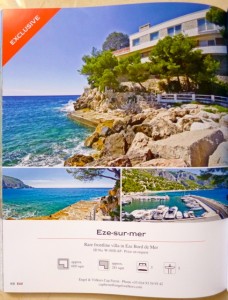
Last month the local Nice Matin newspaper interviewed the head of a big, international estate agency that has opened in neighbouring Juan-les-Pins. The article ran over an entire page entitled l’économie.
The top-tier property market has been very complicated over the past couple years, the président of the local agency told the paper, especially with the French government changing its tax messages and turning the screws on Russian visas. But the glass is half-full, he (unsurprisingly) says. With the administration’s latest leanings, we should see a new trend emerging, one that flings wide the investment doors to clients from Russia, England, the US, Brazil, Northern Europe – and let’s not forget those oil-rich nations! Asians are sticking to Paris and the winegrowing regions for the moment, the agency’s président concedes, but they’ll eventually head south, too – just as the Americans and Russians did when they made their first inroads.
The future is bright – of course it is – but the président warns it’s still a buyers’ market. People won’t pay up for any old thing these days. What’s more, when it comes to the highest quality properties, they’re mostly not for sale. The owners are selling only if they actually need the money.
I nodded on reading this last bit. Philippe and I jumped at a chance to visit one of the Cap d’Antibes’ storied mansions late last summer. A local friend mentioned another friend who might be interested in selling a sprawling property on the tip of the Cap, fronting magically onto both the Bay of Golfe-Juan and the so-called Bay of Billionaires. (The real name of this cove is l’anse de l’argent faux – the Bay of False Money – but I’m guessing some estate agent rebranded it.)
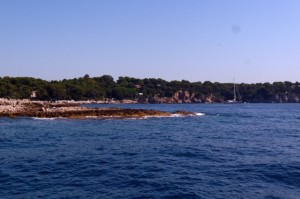
So – why not? – Philippe and I went shopping. With property such an important aspect of real life in the Côte d’Azur, it seemed the right thing to do. But we hardly had an estate agent in tow. No, this was the sort of property that never was openly for sale. It had been in the family for a quarter-century but someday, the landowner knew, the time would be right.
Led around personally by the owner with our mutual friend in tow, we toured seven spacious bedrooms, summer and winter salons with towering arches and pillars made of Tuscan stone, and an interior courtyard dotted with plane trees – their shadows casting an air reminiscent of the picturesque boules square outside the Café de la Place in Saint-Paul de Vence. We waltzed between the estate’s morning and afternoon gardens with their fresh and saltwater swimming pools, juggling vistas of the storied Îles de Lérins on one side with the Cap d’Antibes’ most opulent, renamed bay on the other.
Altogether the estate covered over an acre-and-a-half of the most prime, seaside terrain. So comfortable and all-inclusive was life within its walls, we learned, that the owner often remained here for over a week without even setting foot outside the gate.
I soon began to worry that Philippe was taking on his property-seeking role a bit too wholeheartedly.
But this is the type of property that only sells when the moment is right, absolutely right. A major Russian oligarch offered $135 million for the place, we learned. Money was hardly the issue. The offer was declined on more subjective grounds. The tycoon was furious.
Fortunately the mention of this sum put a kibosh on Philippe’s mushrooming vision.
As we enjoy the modesty of our Bellevue again this summer, the glossy Côte d’Azur property magazine makes its rounds with visitors to our home. They thumb its pages, tempted by the photos and gobsmacked by the fact that someone, somewhere, is paying millions of dollars – sometimes tens of millions of dollars – for properties whose size, relatively speaking, can be measured in lengths of a baguette. And then down goes the magazine again, travelling from table to table in Bellevue’s living room as the weeks pass.
This shameless piece of literature lays on a table in full view when a dear local couple visits for a late afternoon apéritif. It embarrasses me that we’re flaunting such blatant, pleasure-seeking propaganda – that somehow its mere existence will grate against the sunny dispositions of the octogenarian couple who has just walked through our door. But I shouldn’t worry. These folks know the truth of this corner of paradise – and an intrinsic folly that lies within the magazine’s pages.
Jean and Arlette have long links to Bellevue. He’s a sprightly storyteller whose great-uncle built our home in the 30s. She’s his exquisite spouse who lived in this very house as a young girl while World War II broke out, quite literally, on her doorstep. (For their stories, see the series of posts about Bellevue from 2011, starting with this one.)
The four of us move onto Bellevue’s terrace, taking in the view of old Antibes while the daylight softens and cicadas punctuate the air with a rhythmic rubbing of their wings. Over a rainbow of sweet macarons and tea, we discuss the intervening winter and our recent holidays. And as is typical in all our catch-ups, I also launch a few more questions about the historical tale of our Bellevue.
One of today’s questions, I am sure, has an obvious answer. I’m almost reluctant to pose it – except that it’s central to understanding how life has evolved over the generations of Jean’s family. The Guides arrived in this area way back in 1520, laying claim to an enormous – and I do mean enormous – chunk of the Cap d’Antibes and adjoining areas. Today certain handsome parcels remain in the family, but the bulk of their land was sold off, bit by bit, by Jean’s ancestors. Today that sold land comprises some 400 individual lots.
Certainly, knowing what everyone knows about France and its government and its obsession with all things property, the Guide family must’ve found its mass of landholdings expensive. They were mostly unproductive hectares – and French taxes are French taxes. Jean’s ancestors surely ranked among the cash-strapped lords and ladies of the Côte d’Azur.
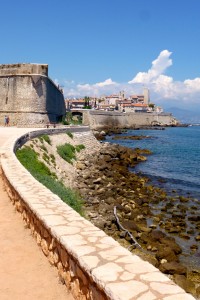
That’s why they began letting go of their land, right? I ask Jean, embarrassed to sound dimwitted in clarifying such an obvious point. The Guides – generally speaking – they sold their land in order to find a better balance between cash flow and taxation demands, right?
Non, Jean’s gravelly, octogenarian’s voice says with evident humour. Not at all. He seems amused at how easily corrupted I am by the area’s current property obsession. You must remember the Cap d’Antibes was far away from everything. The Cap was a remote stretch of land. Sheep grazed out here.
Jean’s gaze shifts across the bay onto the old, limestone city and what remains of its rampart walls. He continues, Antibes was a walled city. It was a military town. People visited Nice and Cannes back then, but they had absolutely no desire to see Antibes.
As the cicadas strum their gentle symphony, Philippe and I nod while Arlette watches demurely as her husband’s passion grows. Now and again, he tells us, estate agents came to his ancestors with proposals to purchase land.
A parcel here, a parcel there, Jean explains. And his family said, why not? The land on the Cap d’Antibes had no value: It’d had no value for 400 years!
He performs a perfect shrug but his eyes remain playful. Who ever guessed things would change?

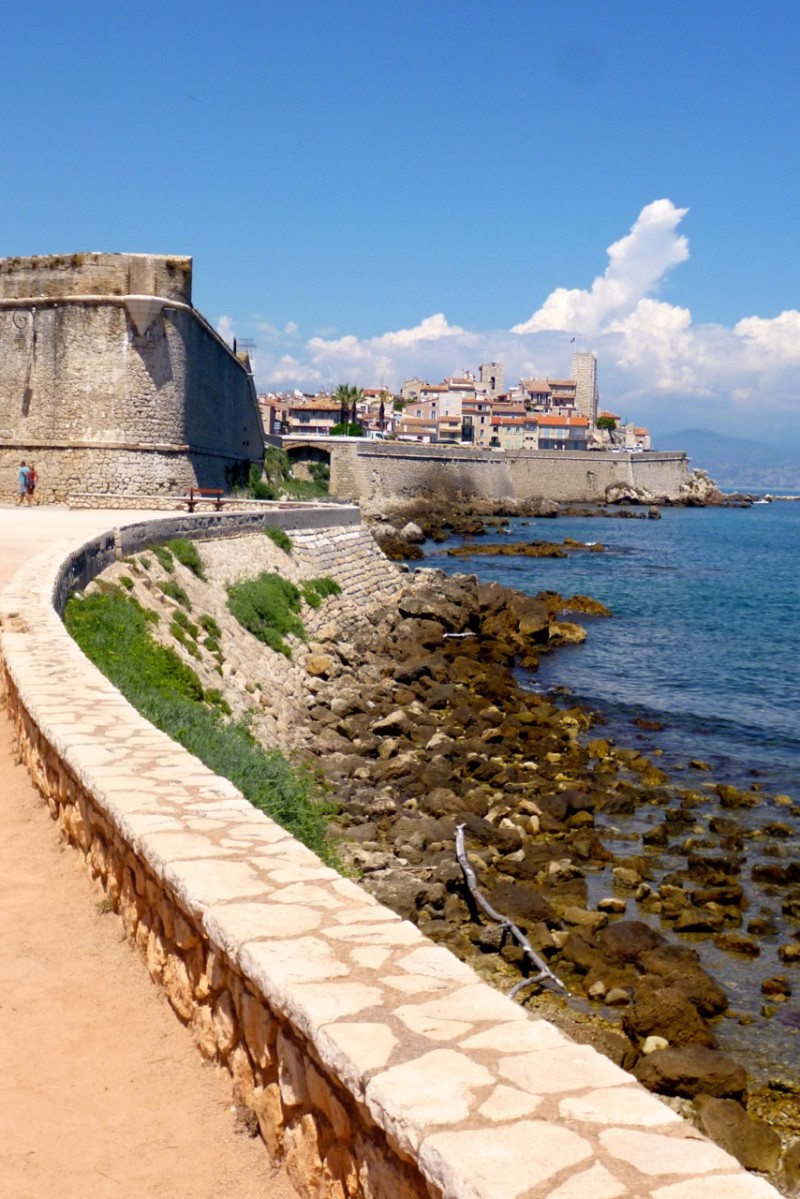
Very, very interesting! Happy you’re interested in history………. so many people today are not.
It seems to seep out of every pore in this place – at least if you’re half-looking for it! Thanks, Neva.
Oh how delightful to catch a glimpse into your summer lives over there, and life in general on the Cote d’Azur. Much more exciting than finding a chipmunk in your kitchen! I guess finding a modest little place for me won’t be so easy after all!
As always, I love your blog. Thanks for writing and sharing details of your adventures!
Heather
Many thanks, Heather – and good luck with that chipmunk!
Most interesting! No matter where in the world we live it’s always worthwhile having a peek at real estate prices like this! Simply mind boggling!
It is great to dream aloud… Thank you!
I really dont mean to be rude, but frankly, I am a little puzzled about your blog — and, alas, the lack pics of a home — Bellevue — of which you seem inordinately fier (unless I missed them).
If I may permit myself some deconstruction… You seem to be an American, probably slightly younger than I, who married an extremely wealthy Canadian, unless your own career gave you the wherewithal to buy property in Antibes fronting the sea.
So why is this blog puzzling?
Amercians are usually pretty down to earth, but your blog conveys a sense of nouveau riche entitlement mixed in with a generous dollop of longing for how la cote used to be — which, unless I read too quickly, neither you nor your Canadian family were involved in any way — mixed in with some conservative teeth gnashing about taxation by the hated Les Socialistes.
Quite frankly, it all does come across as a little ripe: complaining about taxes, when you seem to have been afforded for many years an enviable life of enormous comparative luxury (trips to Africa? bon dieu!– what century is this?)
Personally, I’d ratchet down the Iowa or whatever it is noblesse oblige pose a notch, and maybe listen to Jacques Brel’s La Bonne Dame Patroness. You can do so here, if you wish
https://www.youtube.com/watch?v=kMw8nIZw2js
Then again, you can write off these comments as the inconsequential jalousie-driven rantings of a member of the 99 per cent! Cheers; I look forward to the resumption of this saga, and who knows, maybe I’ll run into y’all in Antibes one day. 😉
Bonjour Alibey,
Merci for reading my blog – and by the sounds of it, quite devotedly so! Merci, too, for caring enough to write.
You have given me pause. I certainly don’t mean to exude any of the ghastliness you describe, though given several months’ distance since writing this post I can understand how it might give off such an air.
Yes, we are proud of Bellevue. Our home has been a decade-long labour of love and exasperation. She – as I’ve begun to consider her as our grande dame – has taken on her own character in these articles, particularly after I devoted a huge chunk of one summer to discovering her roots. (That series of blog posts begins on July 1, 2011.) This particular post weaves in a key character from that series and allows him to deliver the punch line: That today’s widespread adoration of property in the Cap d’Antibes, and the corresponding prices here and elsewhere along the coast ($5 million here, $38 million there), would’ve seemed completely absurd in the not-so-distant past. I have no longing for these former days – you are right, I don’ know them personally – but I find the juxtaposition, past and present, both intriguing and eye-opening.
As for my occasional barbs at the French system of taxation, I hardly try to cloak my steadfast belief in the beauty of small government, a flexible workforce and the economic benefits of an entrepreneurial spirit. But that’s the joy of democracy.
Thank you again, Alibey. I appreciate your feedback and will keep it in mind next season.
I look forward to reading your blog next season, as I lovingly gaze at my old Nice University ID and lament le passé disparu, with a well-thumbed copy of Proust (any of the Prousts) in the grip of my now arthritic right hand. The past is certainly not what it used to be.
😉